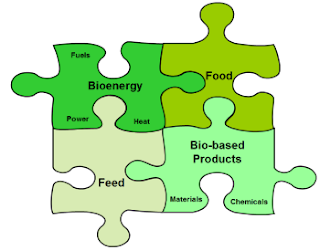
There is a great deal of talk about renewable energy production. And, as in many other production processes efficiency is a key parameter to success.
Many have proposed the idea of biofuel production in the context of a biorefinery.
Within a biorefinery biomass feedstocks and their valuable byproducts can be processed efficiently through physical, biological and chemical unit operations.
It is comparable to an oil refinery where many petrochemical products are recovered. These products could range from basic cattle feed to complex chemicals for industry.
Production processes used to produce biofuels such as bioethanol, biohydrogen, biodiesel, biogas can help produce byproducts such as glycerol, citric acid, lactic acid, isopropanol, vitamins, fibers and adhesives.
Many third generation biofuels like bioethanol from lignocellulosic feedstock could be theoretically produce more economically if those byproducts are also thrown to the mix.
The key is to produce the renewable energy that we need in a sustainable way. An almost zero-emission goal should be implemented where waste streams, water, and heat from one process can be utilize as feed streams or energy for the next.
In conclusion, the biorefinery concept can help us reach a zero emission biofuel production and it can also help the economics of the projects by commercializing valuable byproducts and by integrating productions streams to make them more efficient.
(1) Image from http://www.iea-bioenergy.task42-biorefineries.com/
No hay comentarios:
Publicar un comentario